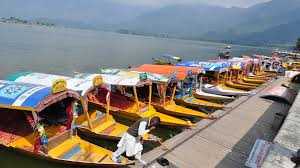
In recent days, the tragic events in Pahalgam have cast a grim shadow over Kashmir’s fragile but hopeful tourism industry—an industry that had only just begun to rise from the ashes of years of instability. Over the past two years, Kashmir witnessed a remarkable revival in tourism. This wasn't just a seasonal uptick in travelers; it was a resurgence of hope, livelihoods, and dignity for thousands of families.
Hotels reported record earnings.
Homestays flourished.
Shikara owners, Gondola operators, transporters, and guides found renewed purpose and pride in their work.
Youth who once viewed unemployment as their only destiny began investing their time, talent, and savings into tourism ventures, building businesses and betting on a better future.
But that hope now hangs in the balance.
Following the Pahalgam attack, cancellations poured in, fear crept back, and with it came economic paralysis. Hotels that once earned crores are now terminating staff. Wages are not being paid. Dreams are once again deferred—not because the region lacks potential, but because it lacks protection.
This is not just an economic downturn—it is a systemic failure. A failure of governance. A failure to create safeguards for the very people who revived Kashmir’s economy. In the private tourism sector, job security remains a luxury. It is no wonder that every Kashmiri parent and child aspires to a government job—not because of higher pay, but because of stability and dignity.
If Kashmir’s private-sector employees—especially in tourism—continue to live with the constant fear of job loss and no safety net, the youth will have no incentive to remain in or return to this sector. We cannot build a sustainable economy on seasonal optimism and zero accountability.
It is time the Labour Department, the Government of Jammu and Kashmir, and the Ministry of Labour and Employment take the following urgent steps:
Regulate hiring and firing policies in the private sector to prevent arbitrary dismissals.
Implement mandatory job security frameworks that ensure basic employee rights, even in downturns.
Introduce minimum income guarantees or seasonal unemployment benefits for tourism workers.
Incentivize businesses that maintain employment during crises, rather than punishing workers for disruptions beyond their control.
This is a call not just for reform, but for justice.
Tourism is not just an industry in Kashmir—it is a lifeline.
And those who make it thrive deserve more than applause; they deserve protection.
If we are to give Kashmir’s youth a reason to believe in their future, we must ensure that working in the private sector—especially tourism—is not a gamble, but a viable, dignified career choice.
Let Pahalgam not just be remembered as a tragedy. Let it be remembered as a turning point—where policy caught up with potential, and the people who power Kashmir’s economy were finally seen, heard, and protected.
In recent days, the tragic events in Pahalgam have cast a grim shadow over Kashmir’s fragile but hopeful tourism industry—an industry that had only just begun to rise from the ashes of years of instability. Over the past two years, Kashmir witnessed a remarkable revival in tourism. This wasn't just a seasonal uptick in travelers; it was a resurgence of hope, livelihoods, and dignity for thousands of families.
Hotels reported record earnings.
Homestays flourished.
Shikara owners, Gondola operators, transporters, and guides found renewed purpose and pride in their work.
Youth who once viewed unemployment as their only destiny began investing their time, talent, and savings into tourism ventures, building businesses and betting on a better future.
But that hope now hangs in the balance.
Following the Pahalgam attack, cancellations poured in, fear crept back, and with it came economic paralysis. Hotels that once earned crores are now terminating staff. Wages are not being paid. Dreams are once again deferred—not because the region lacks potential, but because it lacks protection.
This is not just an economic downturn—it is a systemic failure. A failure of governance. A failure to create safeguards for the very people who revived Kashmir’s economy. In the private tourism sector, job security remains a luxury. It is no wonder that every Kashmiri parent and child aspires to a government job—not because of higher pay, but because of stability and dignity.
If Kashmir’s private-sector employees—especially in tourism—continue to live with the constant fear of job loss and no safety net, the youth will have no incentive to remain in or return to this sector. We cannot build a sustainable economy on seasonal optimism and zero accountability.
It is time the Labour Department, the Government of Jammu and Kashmir, and the Ministry of Labour and Employment take the following urgent steps:
Regulate hiring and firing policies in the private sector to prevent arbitrary dismissals.
Implement mandatory job security frameworks that ensure basic employee rights, even in downturns.
Introduce minimum income guarantees or seasonal unemployment benefits for tourism workers.
Incentivize businesses that maintain employment during crises, rather than punishing workers for disruptions beyond their control.
This is a call not just for reform, but for justice.
Tourism is not just an industry in Kashmir—it is a lifeline.
And those who make it thrive deserve more than applause; they deserve protection.
If we are to give Kashmir’s youth a reason to believe in their future, we must ensure that working in the private sector—especially tourism—is not a gamble, but a viable, dignified career choice.
Let Pahalgam not just be remembered as a tragedy. Let it be remembered as a turning point—where policy caught up with potential, and the people who power Kashmir’s economy were finally seen, heard, and protected.
© Copyright 2023 brighterkashmir.com All Rights Reserved. Quantum Technologies